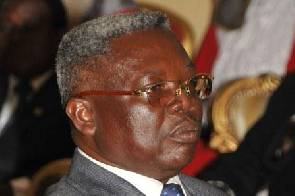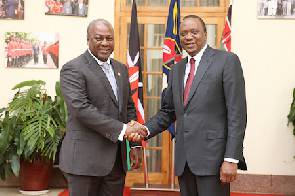 The Sole Commissioner of the Judgement Debt Commission, Mr Justice Yaw Apau, has observed that the failure of the various ministries to consult the Attorney- General’s (A-G’s) Department before signing contracts has cost the country millions of cedis.
The Sole Commissioner of the Judgement Debt Commission, Mr Justice Yaw Apau, has observed that the failure of the various ministries to consult the Attorney- General’s (A-G’s) Department before signing contracts has cost the country millions of cedis.
He said it was wrong for ministries to sign contracts involving huge sums of money without recourse to the A-G, since such contracts had bad clauses which were often exploited to compel the state to pay compensation to contractors.
He, therefore, stressed the need for the ministries to always seek the input of the A-G before signing any contracts.
Mr Justice Apau made the call yesterday when the Director of Administration of the Ministry of Health, Mr Hamidu Adakurugu, told the commission that the ministry did not normally consult the A-G before signing contracts.
Mr Adakurugu said sometimes contracts were prepared by the contractors and taken to the ministers for them to sign.
“How can a ministry sign a contract when the A-G is not aware? When there is a problem, then the state has to pay,” the sole commissioner said.
Judgement debt
Citing one of the difficult contracts, Mr Adakurugu said the ministry signed a contract with five companies in 2008 to provide maintenance services for some hospitals.
Under the contract, he said, the companies were to be paid GH¢1.4 million a year for five years.
He said the government paid the companies GH¢1.4 million in 2008, although the contract had been signed in September 2008.
He said following some media publications against the terms of the contract and a subsequent investigation by the Economic and Organised Crime Office (EOCO), the ministry asked for the suspension of the contract in 2009.
Mr Adakurugu said the five companies took the case to court.
He said the ministry had reached an out-of-court settlement with the companies which enjoined the state to pay them GH¢1.4 million for 2008 work with interest.
In another case, he said, the ministry contracted Mrs Taylor and Taylor Company to supply laboratory equipment to hospitals in 2011.
The company was also required to provide technical support for the maintenance of the equipment.
He said the ministry defaulted in effecting payment after the supplies and the company took the case to court and secured judgement against the ministry.
He said the ministry then requested that it would pay the compensation by instalment every two months.
Mr Adakurugu said the companies disagreed with that arrangement and went back to court in 2012.
The company secured a garnishee order and attached the ministry’s account at the Bank of Ghana (BoG).
He said the ministry was forced to pay the companies GH¢22 million from donor funds in the BoG in 2009.
He said the funds were tied to some programmes and indicated that the donors would not be happy to hear that.
EOCO boss
The Chief Executive Officer of EOCO, Mr Biadela Mortey Akpadzi, also appeared before the commission in respect of the payment of GH¢314,000 land compensation to the Abutia and Adaklo families.
He told the commission that EOCO had asked the BoG not to make that payment in a letter in 2010 following revelations that some of the people were conniving with government officials to dupe the state.
However, Mr Akpadzi said the central bank wrote back to EOCO that it had already released the GH¢314,000 to the two families.





